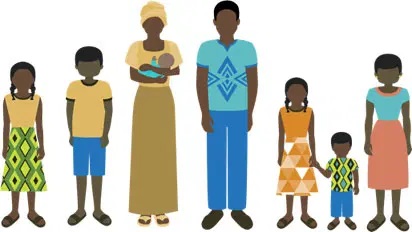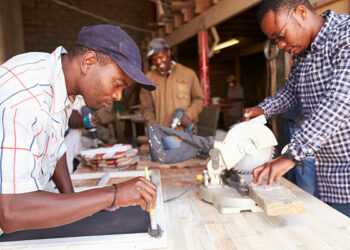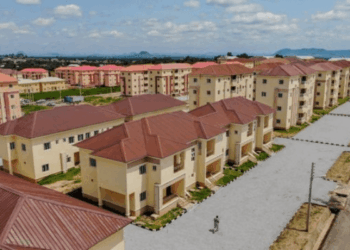Data from the 2018 National Demographic and Health Survey (NDHS) indicates that Nigerian women have an average birth rate of 5.3.
This rate is more than double the global replacement level of 2.1 births per woman needed to sustain a stable population.
The NDHS further shows wide regional variations–women in the North West average 6.7 children, compared with 4.4 in the South-West.
Stakeholders say fertility is strongly linked to education and income, with women in poorer households and those without schooling more likely to have large families.
A 2022 study in BMC Women’s Health found that socioeconomic status, cultural norms, and lack of access to contraception remain powerful drivers of high fertility in Nigeria.
Experts warn that high fertility is not just a private burden but a national challenge; Nigeria’s population grows by more than 5 million people each year, stretching resources for education, healthcare, and jobs.
According to the World Bank, Nigeria has yet to harness the “demographic dividend,” as rapid population growth outpaces economic gains, keeping millions trapped in poverty.
The World Health Organisation (WHO) estimates Nigeria’s maternal mortality ratio at 1,047 deaths per 100,000 live births, one of the highest in the world.
Experts warn that adolescent fertility is also contributing to Nigeria’s high birth rate.
According to UNICEF, one in five Nigerian girls has her first child before the age of 18, a factor that increases health risks and perpetuates cycles of poverty and limited education.
When Mrs Mariam Ibrahim, a 32-year-old mother of four from Nasarawa State, gave birth to her last child, she borrowed money to cover delivery expenses.
Ibrahim said that her husband, a motorbike mechanic, earned barely enough to feed the family; yet, she admitted she had little say in family planning decisions.
“I wanted to rest after my second child, but in our family, having many children is seen as a blessing.”
Her story mirrors the reality of millions of Nigerian women who bear the emotional, physical, and financial toll of high fertility rates.
Seventeen-year-old Hauwa, who dropped out of school after her first pregnancy, also recounts experience.
“I wanted to be a nurse, but once I got pregnant, my parents said I should stay home.
“Now, I just help in the market; I do not know if I will ever go back to school,” she said.
Family planning uptake remains low; the NDHS 2018 puts Nigeria’s contraceptive prevalence rate (CPR) at just 18 per cent, far below the global average of 49 per cent.
In spite of a bold pledge in 2021, Nigeria has not met financing expectations for family planning commodities and services.
A Development Research and Projects Centre (dRPC) report said the Federal Government did not allocate funds for contraceptive commodities between 2021 and 2023.
In 2024, the government allocated N2 billion for family planning commodities.
However, this falls short of the resources required to achieve the National Family Planning Blueprint (2020–2024) and Nigeria’s FP2030 commitments.
The funding deficit has grown steadily, from 12.1 million dollars in 2021 to 25 million in 2022.
In response, national guidelines on state-funded procurement of family planning commodities were introduced, urging states to contribute their resources, but 32-million-dollar gap remains.
Dr Salma Anas, Special Adviser to the President on Health, acknowledged the challenges but said the government was committed to expanding access to modern contraceptives.
“We recognise that high fertility has consequences for maternal and child health, and we are scaling up investment in family planning through the Basic Health Care Provision Fund and partnerships with development partners,” Anas said.
Mr Yusuf Bala, a community leader in Kaduna, explained that men often see large families as a sign of wealth and strength.
“In our culture, children are regarded as assets; many men believe the more children you have, the greater your legacy.
“But this thinking does not always consider the financial and health strain on families,” Bala said.
Some religious leaders are beginning to shift the conversation.
According to Sheikh Abdullahi Musa, an Islamic cleric in Kano, Islam values children, but it also teaches responsibility.
“Spacing children for the health of the mother is allowed and even encouraged.
“Our people must understand that planning is not against faith,” Musa said.
Health workers said the high birth rate is overwhelming already fragile health services.
According to Mrs Grace Okon, a midwife in Cross River State, there are too many patients for the number of midwives available.
“Sometimes, a single nurse handles four women in labour at once; family planning will reduce pressure on the system and improve care for mothers,” she said.
Data also shows a sharp divide between rural and urban areas.
Rural women average nearly two more children than urban women, reflecting differences in education, income, and access to health services.
Experts said bridging this gap is critical to reducing fertility nationwide.
More so, civil society organisations said there is need for Nigeria to do more than make pledges.
Dr Funke Adebayo, Women’s Health Advocacy Network, called on government to up its game.
“The government’s allocations are not enough, and states are not fully stepping up either; without proper accountability, the funding gap will persist,’’ he said.
Some states, however, are showing progress.
Kaduna State, through its partnership with development partners and strong political commitment, has seen contraceptive uptake rise above the national average.
Advocates say this proves change is possible when leadership and resources align.
Other African countries have shown that progress is possible.
For example, Ethiopia reduced its fertility rate from 6.4 in the 1990s to about 4.0 in 2020, largely through investments in female education and family planning services.
Stakeholders said Nigeria can achieve similar results if policies are backed with strong funding and community buy-in.
For women like Ibrahim, the issue is not just about numbers, but about survival and dignity.
“I wish I had more power to decide when to stop,” she said.
As Nigeria approaches its FP2030 targets, experts hold stress that scaling up family planning is not just a women’s issue but a national priority.
They say without urgent action, millions of women like Ibrahim will continue to shoulder the burden of high fertility at great cost to their health, their families, and the country’s future. NAN





